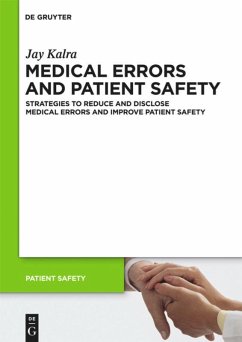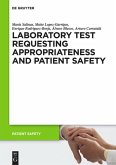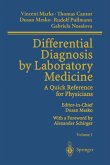Is the reporting of medical errors changing? This book shows with real cases from health care and beyond that most errors come from flaws in the system. It also shows why they don't get reported and how medical error disclosure around the world is shifting away from blaming people, to a "no-fault" model that seeks to improve the whole system of care.
The book intends to provide an introduction to medical errors that result in preventable adverse events. It will examine issues that stymie efforts made to reduce preventable adverse events and medical errors, and will moreover highlight their impact on clinical laboratories and other areas, including educational, bioethical, and regulatory issues. Varying error rates of 0.1-9.3% in clinical diagnostic laboratories have been reported in the literature. While it is suggested that fewer errors occur in the laboratory than in other hospital settings, the quantum of laboratory tests used in healthcare entails that even a small error rate may reflect a large number of errors. The interdependence of surgical specialties, emergency rooms, and intensive care units - all of which are prone to higher rates of medical errors - with clinical diagnostic laboratories entails that reducing error rates in laboratories is essential to ensuring patient safety in other critical areas of healthcare.
The author maintains that many such errors are preventable provided that appropriate attention is paid to systemic factors involved in laboratory errors. This book identifies possible intelligent system approaches that can be adopted to help control and eliminate these errors. It is a valuable tool for physicians, clinical biochemists, research scientists, laboratory technologists and anyone interested in reducing adverse events at all levels of healthcare processes.
Hinweis: Dieser Artikel kann nur an eine deutsche Lieferadresse ausgeliefert werden.
The book intends to provide an introduction to medical errors that result in preventable adverse events. It will examine issues that stymie efforts made to reduce preventable adverse events and medical errors, and will moreover highlight their impact on clinical laboratories and other areas, including educational, bioethical, and regulatory issues. Varying error rates of 0.1-9.3% in clinical diagnostic laboratories have been reported in the literature. While it is suggested that fewer errors occur in the laboratory than in other hospital settings, the quantum of laboratory tests used in healthcare entails that even a small error rate may reflect a large number of errors. The interdependence of surgical specialties, emergency rooms, and intensive care units - all of which are prone to higher rates of medical errors - with clinical diagnostic laboratories entails that reducing error rates in laboratories is essential to ensuring patient safety in other critical areas of healthcare.
The author maintains that many such errors are preventable provided that appropriate attention is paid to systemic factors involved in laboratory errors. This book identifies possible intelligent system approaches that can be adopted to help control and eliminate these errors. It is a valuable tool for physicians, clinical biochemists, research scientists, laboratory technologists and anyone interested in reducing adverse events at all levels of healthcare processes.
Hinweis: Dieser Artikel kann nur an eine deutsche Lieferadresse ausgeliefert werden.








